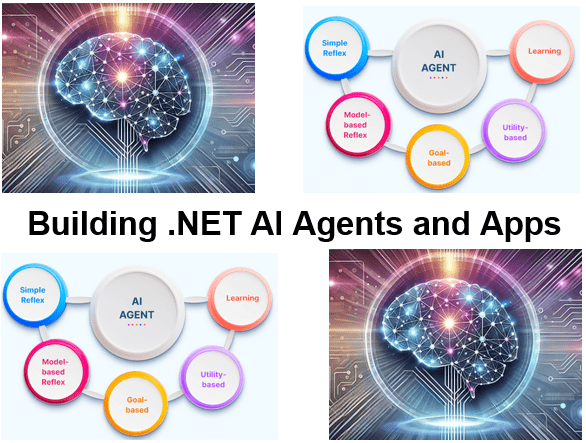-
Learning by doing
-
Trainers with practical experience
-
Classroom training
-
Detailed course material
-
Clear content description
-
Tailormade content possible
-
Training that proceeds
-
Small groups
The course Building dotNET Agents and Apps from SpiralTrain teaches you how to develop AI-powered applications and agents using modern .NET tools and platforms. You will explore AI integration in .NET 8, work with ML.NET, Azure AI, and OpenAI, and create smart agents using Microsoft's Semantic Kernel. By the end, you'll be ready to build intelligent, full-stack .NET apps infused with machine learning and natural language capabilities.
Covers the AI landscape within .NET: ML.NET, ONNX, Azure AI, LLMs, Copilot, and .NET 8 features. Learn core terms like inference, agents, and prompts and explore practical use cases.
Walks through creating ML.NET pipelines, training models, and deploying them via web APIs. Learn evaluation, feature engineering, and how to integrate models into real .NET apps.
Connect to OpenAI and Azure Cognitive Services via C#. Create intelligent agents, chat assistants, and analyze costs and streaming responses. Learn secure integration practices.
Learn to create AI agents using Microsoft's Semantic Kernel. Understand plugins, memory, skills, planning, and integrate external APIs like calendar/weather into goal-driven agents.
Focus on prompt crafting and templating, vector search, embeddings, and building RAG-based solutions in .NET. Learn how to handle hallucinations and design interactive NL interfaces.
Build and deploy full AI solutions with Blazor or ASP.NET Core. Use SignalR for real-time feedback, manage long tasks, and deploy with Azure. Final project ties it all together.
This course is intended for .NET developers, architects, and AI enthusiasts who want to integrate intelligent features and agents into modern .NET applications.
Participants should have a basic knowledge of C# and .NET development. Familiarity with APIs, Visual Studio, and basic AI concepts will be helpful.
The course combines theoretical sessions with hands-on labs guided by an expert trainer. Practical exercises and real-world applications are central to the training experience.
After completion, participants receive a certificate of participation in Building .NET Agents and Apps.

Module 1: Intro to AI and .NET |
Module 2: Smart .NET Apps ML.NET |
Module 3: OpenAI and Azure AI |
|
Overview of AI/ML in .NET Key concepts: Models, Inference, Agents ML.NET, Azure AI, ONNX LLMs and modern app development Cognitive services and APIs Cloud vs local AI models .NET 8 AI features Setting up environment Copilot in .NET productivity Use cases in .NET AI |
Intro to ML.NET Building a sentiment model Data processing and features Using Model Builder Saving/loading models Evaluation and tuning ML in ASP.NET Deploying prediction APIs Production model usage Model integration patterns |
OpenAI API in .NET Azure OpenAI differences API key setup & auth First GPT request in C# Creating chat assistant Token cost management Streaming responses Vision/Speech/Language APIs Azure Translator in apps Building Azure + OpenAI bots |
Module 4: AI Agents Tooling |
Module 5: Prompt Engineering |
Module 6: Deploying .NET AI Apps |
|
What is an AI Agent? LangChain vs Semantic Kernel Semantic Kernel SDK intro First AI agent in .NET Plugins & skills in SK Planning strategies Memory and context External API integration Logging and debugging Use case: Calendar agent |
Prompt engineering basics Templated prompts in SK Chaining prompts Managing conversation history Prompt tips for .NET devs Vector search with embeddings Using Pinecone, Redis, AI Search RAG pattern implementation Use case: Doc Q&A system Fallback and hallucination handling |
Building full-stack AI apps Blazor vs ASP.NET AI UIs Secure HTTP APIs SignalR for live AI updates Caching/throttling responses Long-running workflow handling Azure App Service & Containers Testing strategies & logging NuGet packaging of agents Final project: AI assistant demo |
